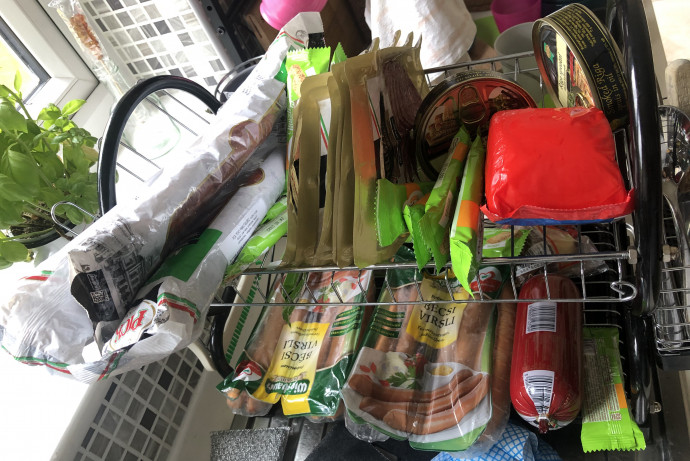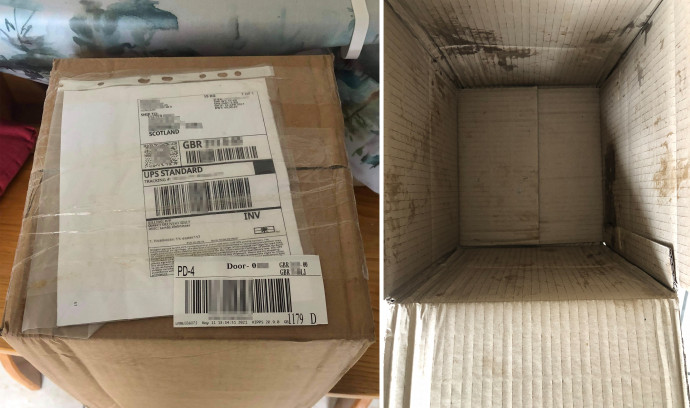A mother wanted to send some jam, sausage, and cheese to her daughter in Scotland and lost 130 euros in the process

How can we mail food products to Great Britain in the wake of Brexit? In this story, we see how one Hungarian family seriously struggled through the process. Despite the package having been thoroughly gutted, the family was still charged duty fees and late-payment interest for the „entire” package, and no one is taking responsibility for the damage. Translation by Dominic Spadacene.
One Hungarian mother simply wanted to send some food to her daughter in Scotland. However, after weeks of roaming around, the Hungarian-styled care package, which contained cheeses, sausages, jams, and dairy products, had been thoroughly rummaged through. Moreover, the family even received a notice regarding the payment of duty fees calculated based on the original value of the package. And due to the duration of the ordeal, the bill included interest for late payment. As of yet, the family has not received any form of compensation.
Even Eszter admitted to Telex that it might not have been the best idea to ship a box of Hungarian food, but as she explained, it was particularly difficult to travel home from Scotland during Covid. The family had not reunited for a year and a half. Furthermore, when the generous idea first occurred to the family, no alarms went off for them as the food items chosen for the journey were durable goods. What's more, Spanish, French, and Italian friends residing in the same Scottish city had also successfully received treats from home in this manner, including ham.
How could this have happened?
Who's at fault? Perhaps Brexit, which introduced time-consuming and inflexible customs inspections of packages destined for Great Britain from the EU? Or maybe the parcel delivery service provider, UPS, which has been avoiding all responsibility? Perhaps the mother herself, who wanted to send a bit of sausage, jam, and honey to her daughter? The latter can be ruled out, as she – insofar as we have been informed – complied with all the regulations, British and Hungarian. Naturally, Brexit is certainly to blame since it has become much more difficult for relatives at home to stay in touch with the great many Hungarians living abroad, e.g. in London. The service provider in question, UPS, all the while points to its contracts, general rules and the time-lapse of the case. And although the delivery company may have protected itself from all risks with the relevant clauses and paragraphs, it's nevertheless a terrible message to send that no one bears the responsibility for the package's arrival. If anything happens and the client is blameless, they have no one to turn to who will defend their interests and nowhere to go to assert their complaint.
Eszter's case
Let's first take a closer look at the case at hand. This past April, Eszter's parents sent off a 15-kg package containing sausages, salami, bologna, jam, cheeses, puddings, and other domestic comestibles, the total value of which came in at about 85 euros. The delivery cost roughly 45 euros. Eszter's parents specifically chose a carrier because UPS promised the fastest delivery, according to which it was calculated that the package would arrive within the usual seven business days.
Well, not only did the package not arrive, what began as a sweet parental gesture became a seemingly neverending nightmare. After the parents sent off the package, it first got held up at the Hungarian border. As it turned out, the parcel was missing a waybill. Of course, no one had indicated to the sender the need for it, but it wasn't a big deal as they later supplemented the package with one.

At this point, the package was on its way and even managed to reach Stanford-le-Hope in southeast England, but it was held up there for another week. This time it was waiting at British customs. After some investigation, the consignee finally found out what had happened (while the chat- and email correspondences were made available to us, we naturally don't have access to the phone conversations). This time the reason for the holdup was that some of the accompanying documents were filled out only in Hungarian. Following their translation as well as the rendering of the amounts originally given in Hungarian forints into British pounds, finally, many weeks after dispatch, the 15 kilograms of foodstuffs arrived. That is to say, of course not 15 kilograms. That was merely the package's initial weight when it was sent off. Rather what arrived was a small box weighing just a few kilograms.
The package had been plundered
The battered and deformed parcel was missing its original packaging (Eszter's mother had individually wrapped its contents multiple times), and everything had been opened. What's more, there was a strange logic to what had been pilfered: not everything had been taken, not even within a given product group. Instead, out of the four sticks of a given meat package, for example, one had arrived, whereas the other three didn't.
When Eszter complained, the process hit a roadblock when the question arose as to who is even entitled to register a complaint at all: the recipient of the package or the sender. At that point, the parents also lodged a complaint but from the Hungarian side. UPS Magyarország Kft., however, deflected it and even went so far as to counterattack.
The customer service representative indicated that the missing items were prohibited, perishable products and were therefore seized by the customs office. The parcel that had been prepared may carry with it criminal liability. Moreover, the company also pointed out that the selected shipment method had been standard, not guaranteed, so they were not in a position to assess the damages claim in a positive manner.
The idea that the customs office would have seized something seemed particularly unlikely: if perhaps a customs officer deems the transport of homemade jam or honey as a food safety issue, that's one thing, but if a certain item is prohibited, then why were only a few of them taken out and the rest left in the package?
And then yet another surprise
By the end of the troublesome delivery, the family was ready to let go of the entire issue along with the failed complaint resolution. However, around two or three months after the shipment, towards the end of July, UPS sent another bill amounting to 26 British pounds for customs debt and a late fee. According to the bill, the duty had been calculated on April 29 and invoiced on July 30. This was all strange because, according to earlier information, this was when the goods were being held up at customs.
In response to the complainant's new letters, Hungary's UPS then cited time-lapse, i.e. that the two months had passed.
The family worked out that their loss amounted to 130 euros:
- 45 euros for a delivery that didn't reach its destination,
- 55 euros was the total value of the missing goods,
- 30 euros for the duty that had to be paid for the items that were not even delivered.
Telex also followed up
Naturally, we also reached out to UPS, which readily responded. As a first step, they sent the delivery conditions, which can also be downloaded from UPS's website. Said conditions apply to every country and, as UPS wrote in their response, they contain the answer to any question.
But the package didn't conflict with any of the various rules stipulated by UPS (prohibited goods, large size, and excessive value or weight), in the same way it didn't conflict with British food regulations.

Meat, eggs, dairy products, and even honey can be transported from the EU (and from a few other similarly developed nations: Norway, Switzerland, Liechtenstein, San Marino, and Andorra). The only restrictions state that the products must be exclusively for personal consumption and include certain quantitative limits, but the package in question complied with all of them.
Since the company offered us to pose any unresolved questions that we might still have, we replied with some.
We were mainly interested in determining where the customer had erred and what they should have done differently.
In their reply, the company described the complaint resolution and compensation procedures in general. With regards to the case at hand, the company stated that it denies a compensation procedure at the outset if it was initiated more than 60 days after the package's last status scan. That is, the customer has 60 days to initiate the compensation procedure.
Yet in the present case, the customer/consigner and the consignee protested continuously with both the UK's and Hungary's branches. However, according to UPS's interpretation, following the customer's decision, it requested an investigation in the UK on May 19. Then, by the time the customer lodged another complaint on August 13 (when the customs duties appeared), more than 60 days later, the competent department was not in a position to initiate the procedure and thus rejected the claim.
And so ends this Kafkaesque story. Yet there remains one question: was this merely a unique case where all the pieces came together in an unfortunate manner, or has it really become near impossible to send food to Great Britain?
The translation of this article was made possible by our cooperation with the Heinrich Böll Foundation.